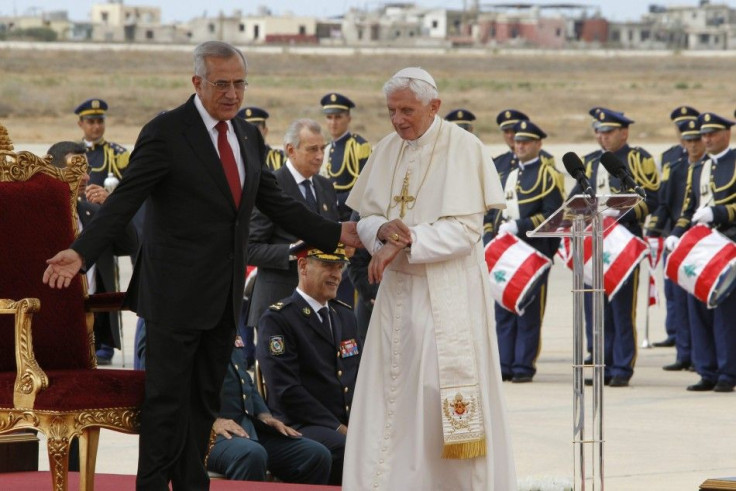Pope Benedict Visits Lebanon As Protests Spread Over 'Innocence If Muslims' Movie

Pope Benedict XVI arrived in Lebanon Friday amid heightened tensions in the Muslim and Arab world as protests escalated, some violent, in response to an anti-Islam movie, 'Innocence of Muslims,' produced in the U.S.
The Pope began his three-day visit to Lebanon in the city of Tripoli, where he expressed support for Christians throughout the Middle East and North Africa, praising Lebanon as an example of religious tolerance and diversity without directly addressing the movie or the violence that has erupted around it.
Lebanon is about 40 percent Christian, one of the highest such figures in the Middle East.
"Like me, you know that this equilibrium, which is presented everywhere as an example, is extremely delicate," the pope said, the New York Times reported.
"Sometimes it seems about to snap like a bow which is overstretched or submitted to pressures which are too often partisan. This is where real moderation and great wisdom are tested."
The Vatican has responded to the recent unrest in the region, which has witnessed protests at U.S. embassies in Egypt and Yemen as well as an attack on the U.S. consulate in Libya, resulting in the murder of Ambassador Chris Stevens and three other staff members.
"The very serious attack organized against the United States diplomatic mission in Libya, which led to the death of the ambassador and of other functionaries, calls for the firmest possible condemnation on the part of the Holy See," Vatican spokesman Rev. Federico Lombardi said in a statement Thursday, the JTA news service reported.
"Nothing, in fact, can justify the activity of terrorist organizations and homicidal violence. Along with our sadness, mourning and prayers for the victims, we again express the hope that, despite this latest tragedy, the international community may discover the most favorable ways to continue its commitment in favor of peace in Libya and the entire Middle East."
Christians throughout the region are becoming increasingly uneasy as Islamist militants gain wider influence and support following the political instability that has been left in the wake of the popular uprisings of the Arab Spring.
Following the ouster of President Hosni Mubarak in Egypt, many members of the conservative Islamic Muslim Brotherhood movement have been elected to office, including the President Mohammad Morsi, though he has stressed that he intends to lead a moderate government. The ultra-conservative Salafist, however, remain a significant political minority within the new government.
Nevertheless, there are concerns that the country's Christian community may become politically marginalized if laws align more with Muslim identity rather than hewing to secularity.
As the political transition in Libya continues following the overthrow of Muammar Gaddafi, fundamentalist Islamic groups have resurfaced after years of suppression, and it is these very same extremists who attacked the U.S. consulate and murdered four Americans.
Prior to arriving in Lebanon, the Pope told reporters that the Arab Spring has, in general, been "positive," according to the Associated Press.
"It is the desire for more democracy, for more freedom, for more cooperation and for a renewed Arab identity," he added.
The Pope also cautioned against the dangers that can arise during social upheavals.
"[T]here is always a danger of forgetting a fundamental aspect of liberty: tolerance for others and the fact that human liberty is always a shared liberty," he said, according to the Times.
© Copyright IBTimes 2025. All rights reserved.





















